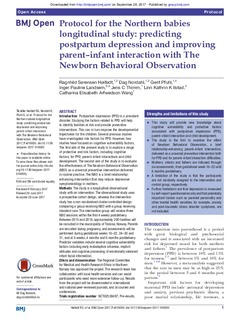Protocol for the Northern babies longitudinal study: predicting postpartum depression and improving parent–infant interaction with The Newborn Behavioral Observation
Høifødt, Ragnhild Sørensen; Nordahl, Dag; Pfuhl, Gerit; Landsem, Inger Pauline; Thimm, Jens; Ilstad, Linn Kathrin K.; Wang, Catharina Elisabeth Arfwedson
Journal article, Peer reviewed
Published version
Permanent lenke
http://hdl.handle.net/11250/2457509Utgivelsesdato
2017Metadata
Vis full innførselSamlinger
- Institutt for psykologi [3107]
- Publikasjoner fra CRIStin - NTNU [38289]
Originalversjon
http://dx.doi.org/10.1136/bmjopen-2017-016005Sammendrag
Introduction Postpartum depression (PPD) is a prevalent disorder. Studying the factors related to PPD will help to identify families at risk and provide preventive interventions. This can in turn improve the developmental trajectories for the children. Several previous studies have investigated risk factors for PPD. However, few studies have focused on cognitive vulnerability factors. The first aim of the present study is to explore a range of protective and risk factors, including cognitive factors, for PPD, parent–infant interactions and child development. The second aim of the study is to evaluate the effectiveness of The Newborn Behavioral Observation (NBO) as a universal preventive intervention delivered in routine practice. The NBO is a brief relationship-enhancing intervention that may reduce depressive symptomatology in mothers.
Methods The study is a longitudinal observational study with an intervention. The observational study uses a prospective cohort design, whereas the intervention study has a non-randomised cluster-controlled design comparing a group receiving NBO with a group receiving standard care. The intervention group will receive three NBO sessions within the first 4 weeks postdelivery. Between 2015 and 2018, approximately 200 families will be recruited in the municipality of Tromsø, Norway. Parents are recruited during pregnancy, and assessments will be performed during gestational weeks 16–22, 24–30 and 31, and at 6 weeks, 4 months and 6 months postdelivery. Predictor variables include several cognitive vulnerability factors including early maladaptive schemas, implicit attitudes and cognitive processing of emotionally valenced infant facial information.
Ethics and dissemination The Regional Committee for Medical and Health Research Ethics in Northern Norway has approved the project. The research team has collaboration with local health services and can assist participants who need more extensive follow-up. Results from the project will be disseminated in international and national peer-reviewed journals, and at courses and conferences.

